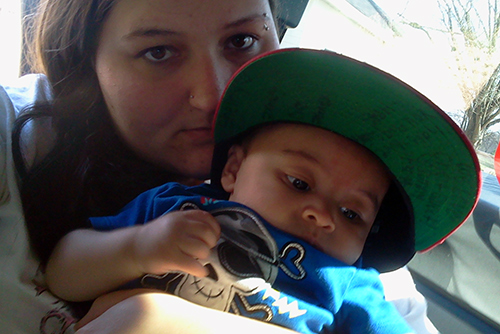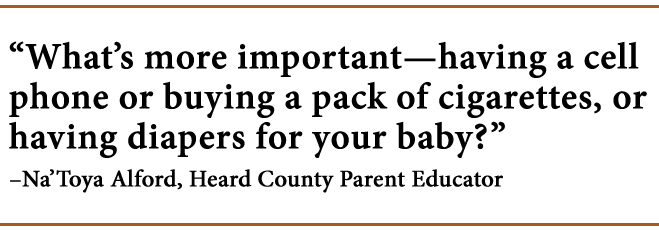Circle of Care Embraces Heard’s Youngest Parents
Print This Post |
| Tony Liam cuddles up to his mom, Jamie Nash, a 21-year-old single mother from Franklin, who has been involved with Circle of Care since she first became pregnant. |
BY DIANA ST. LIFER
The Twin Cedars Circle of Care program has two primary goals: To prevent teen mothers from having another unplanned pregnancy and to encourage them to return to high school to earn a diploma or GED.
“The teen pregnancy population had gone to astronomical numbers, and we knew we had to do something,” said Deidtra Jackson, coordinator for Circle of Care, which the Troup Family Connection Authority started in 1997.
The program offers services to youth between the ages of 10 and 23. “Last year we extended the age limit from 21 to 23,” said Jackson. “Our experience is that the 21- to 23-year-old populations, although adults, were lacking in nurturing and parenting skills. We were getting a lot of calls from parents over 21, so we extended the age.”
The program, which also operates in Troup and Meriwether counties, was brought to Heard last year through a grant from the Governor’s Office of Children and Families and is supported in part by Kaiser Foundation. There are eight participants in the Heard County program ranging in ages from 16-21. Seven of the mothers have a child under the age of 7 months, and one 17-year-old is pregnant.
Each Circle of Care program has a parent educator who oversees a wide range of services including home visits, in-school classes, evening workshops, transportation assistance to doctor appointments, and other support the mothers and their babies may need. Parents can participate in the Circle of Care program until their child is 3 years old.
Na’Toya Alford, the parent educator in Heard County, says she uses a curriculum that is developmentally appropriate for the child’s age and focuses on the parent-child interaction and the overall well-being of the family. For the pregnant teen, the focus is on prenatal care, including proper nutrition, exercise, sleep and overall health, which includes understanding the risks associated with low birthweight babies.

“I go over with a pregnant teen the importance of a healthy diet,” Alford said. “Together we create a daily health plan that outlines the amount of vegetables she should have in her diet, how much fruit, and the types of protein.”
The in-school classes are held twice a week for 60-90 minutes and topics range from life skills to money management. “We focus on a lot of needs-versus-wants issues,” Alford said. “Sometimes I have to help them put things in perspective. I ask them, ‘What’s more important—having cell phone or buying a pack of cigarettes, or having diapers for your baby?’ We talk in depth about these things.”
The class also offers a safe space for the pregnant and parenting teens to be open and share their experiences. “It’s an opportunity for them talk with each other about what they’re going through,” Alford said. “They discuss what they’re facing at home and they feel comfortable expressing themselves.”
The evening classes, which are held twice a month, focus on group activities that foster parent-child interaction.
Jamie Nash, a 21-year-old single mother from Franklin, has been involved with Circle of Care since she first became pregnant. Her son, Tony Liam, is now two months old. She attends the weekly nutrition classes and the monthly parenting classes, and receives home visits once a week.
“Na’Toya taught me how to develop a strong bond with my baby and how I can help him learn and grow,” said Nash.
While none of the mothers currently in the Heard Circle of Care program delivered LBW babies, Alford said she stresses to the teens all the risks associated with another unplanned pregnancy.
“We have that conversation,” Alford said, adding that she feels a comprehensive sexual education program is lacking. “I wish there was more done in the schools. The only information they get is in their health class. There aren’t any other resources.”
Diana St. Lifer is a professional writer with more than 25 years’ experience. She holds a bachelor’s degree in communications, a post-B.A. certificate in child advocacy, and is a certified professional life coach who specializes in teen and adolescent issues.
Heard may have the smallest population of the four counties participating in Georgia Family Connection’s Low-Birthweight cohort, but everyone involved is big on ideas on how to best serve pregnant and parenting women. The challenge is resources for the 301-square-mile county that 11,600 residents call home. With no hospital or obstetrician located within Heard, expectant mothers must travel beyond county lines for prenatal care and delivery. The only place for any type of prenatal information in the county is the health department.
Read “Partnering for Success: Heard Takes Low-Birthweight Initiative Beyond County Lines.”
Low birthweight, childhood obesity, and a literacy gap are serious threats to the well-being of Georgia’s families and children. Recognizing the impact these pressing issues have on the state’s health, safety, and ability to prosper, Georgia Family Connection Partnership has launched three initiatives dedicated to developing and implementing strategies that address these key indicators.
Read “Eleven Family Connection Collaboratives Team Up to Tackle Key Indicators of Child and Family Well-Being.”
